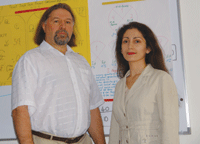Indo-Russian ties have never been as warm as they were in the period 1957-1990 when the United Socialist Soviet Republics dominated by Russia was India’s closest ally at the height of the cold war between the capitalist USA and socialist USSR. But following the collapse of the Soviet Union and USSR in 1991 and India’s economic right turn in 1992, the great camaraderie between Russia and India — based on two of the world’s greatest kleptocracies trading with each other for the mutual benefit of their officials — also collapsed.
 However one individual who has taken it upon himself to restore the ancient friendship between India and Russia, which “preceded the October 1917 revolution in Russia by several milleniums”, is Vladimir Petrov, director general of the Ahmedabad-based Holistic Teacher Training Program. A German language and music (classical guitar) graduate of Irkutsk University (Russia), with over 30 years of experience of teaching, training and scientific investigations in that country, Petrov has been a frequent visitor to India and has considerable knowledge of this country’s primary and secondary school system.
However one individual who has taken it upon himself to restore the ancient friendship between India and Russia, which “preceded the October 1917 revolution in Russia by several milleniums”, is Vladimir Petrov, director general of the Ahmedabad-based Holistic Teacher Training Program. A German language and music (classical guitar) graduate of Irkutsk University (Russia), with over 30 years of experience of teaching, training and scientific investigations in that country, Petrov has been a frequent visitor to India and has considerable knowledge of this country’s primary and secondary school system.
Petrov believes that Indo-Russian cooperation in education and particularly the import of tried and tested teacher training and whole school development systems and pedagogies can dramatically transform the education scenario for the better in this country. To this end Petrov and his wife Marina, who moved base from Russia to Ahmedabad last September, are currently introducing school managements to their System of Collective Teaching under which everyone in every classroom is a peer teacher, with the teacher, transforming into a guide and facilitator.
“This pedagogy was invented as far back as in 1919 and developed by a series of educators in Russia and has been used in my country with dramatic results in terms of measured learning outcomes. Recently we introduced two innovative systems in several schools of the Anand Niketan TGES in Ahmedabad with excellent results in terms of student personality changes and learning outcomes. This system is also very useful for the purposes of teacher training and development. We need to give fresh college graduates only five months of training; they can teach students much better than teachers with 20-30 years of experience,” says Petrov.
Although the Petrov duo has received numerous offers from Indian educators anxious to purchase their collective teaching system, they stress that they aren’t looking for purchasers or franchisees. Instead they have drawn up a blueprint for establishing a UN approved International Model Scientific Educational Production Centre aka Agni, at a budgeted cost of Rs.20 crore for which they seek collaborators. “Synthesizing science, education and production, Agni will be one of the best model education centres in India. This pedagogy can compress annual curriculums into monthly learning programmes which will revolutionise Indian education,” vows Petrov.
There’s unanimity that India’s moribund teacher training systems and pedagogies need a radical makeover. But on the subject of whether there will be takers for Petrov’s solutions or centre, best of luck!
Dilip Thakore (Bangalore)